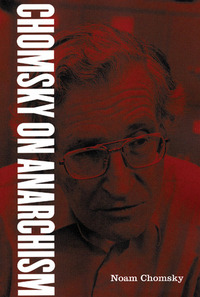Take a photo of a barcode or cover
hopeful
informative
reflective
medium-paced
I should have read a bit about the book before my purchase. I was surprised to find that this is not a new, original book by Chomsky, but a collection of various lectures and essays. I was a bit turned off by the format, especially since everything is available for free (and legally) online. This is largely why I'm only giving it 3 stars.
I knew very little about anarchism before reading this. Every anarchist I have talked to has been very vague about what they think anarchism is. After reading this, I understand why. I now have the view that anarchism is more a reaction to an unjust governance than a detailed description of what society should look like. Its reactionary instead of prescriptive. To Chomsky, a form of government has to have certain characteristics to be classified as anarchism, but outside of these few things it's relatively open ended. The basic tenets I've gleaned from this book are:
1) Power is always illegitimate unless it proves itself otherwise. Those holding power must have legitimate reasons to have the power, and have to provide the proof to the people why they should maintain that power. If they cannot, then they must be removed from power.
2) Society (Government?) will be "ground up", meaning the people in the society democratically make the laws the people must follow.
3) Work must be collectively organized (aka socialism, or worker owned and operated).
Beyond that, there is little else to say of what an anarchist society "should" look like. A good portion of the book discusses the Spanish Civil War and how large areas of Spain was collectivized under the anarchist flag. This part of the book was fascinating to me because I hadn't really encountered anything about the history before. Chomsky makes strong arguments that these anarchist groups formed just and self-sufficient societies, and would have continued to do so had the communists, fascists, and western democracies not stepped in and dismantled what they had built. As a follow up, I want to read Homage to Catalonia by George Orwell to learn more.
To break it all down, anarchy seems to be semi-equivalent to libertarian socialism. I mean (and so does Chomsky) libertarian in the classical sense, not this bastardized American "libertarian" word used today, that has nearly the opposite meaning of what it should. I could conceivably agree that this is a societal structure that is preferable to what we currently have in the western world, but I still have many concerns that would need to alleviated before I could sign on. Chomsky mentions groups in Israel who essentially have an anarchist structure, and describes how incredibly racist they are. In this line of thought, I see no reason to believe an anarchist society would protect the minority. This is one of the reasons a constitutional democracy is so powerful, it sets up certain protections for those that would fall outside the majority group and could be preyed upon. I don't mean to say that an anarchical society couldn't have a constitution, but it doesn't seem to be one of the guarantees focused on when discussing the concept with anarchists.
In the end, this book is good, but probably is not the best introduction to anarchist thought. I'd be open to suggestions of a better, more accessible read.
I knew very little about anarchism before reading this. Every anarchist I have talked to has been very vague about what they think anarchism is. After reading this, I understand why. I now have the view that anarchism is more a reaction to an unjust governance than a detailed description of what society should look like. Its reactionary instead of prescriptive. To Chomsky, a form of government has to have certain characteristics to be classified as anarchism, but outside of these few things it's relatively open ended. The basic tenets I've gleaned from this book are:
1) Power is always illegitimate unless it proves itself otherwise. Those holding power must have legitimate reasons to have the power, and have to provide the proof to the people why they should maintain that power. If they cannot, then they must be removed from power.
2) Society (Government?) will be "ground up", meaning the people in the society democratically make the laws the people must follow.
3) Work must be collectively organized (aka socialism, or worker owned and operated).
Beyond that, there is little else to say of what an anarchist society "should" look like. A good portion of the book discusses the Spanish Civil War and how large areas of Spain was collectivized under the anarchist flag. This part of the book was fascinating to me because I hadn't really encountered anything about the history before. Chomsky makes strong arguments that these anarchist groups formed just and self-sufficient societies, and would have continued to do so had the communists, fascists, and western democracies not stepped in and dismantled what they had built. As a follow up, I want to read Homage to Catalonia by George Orwell to learn more.
To break it all down, anarchy seems to be semi-equivalent to libertarian socialism. I mean (and so does Chomsky) libertarian in the classical sense, not this bastardized American "libertarian" word used today, that has nearly the opposite meaning of what it should. I could conceivably agree that this is a societal structure that is preferable to what we currently have in the western world, but I still have many concerns that would need to alleviated before I could sign on. Chomsky mentions groups in Israel who essentially have an anarchist structure, and describes how incredibly racist they are. In this line of thought, I see no reason to believe an anarchist society would protect the minority. This is one of the reasons a constitutional democracy is so powerful, it sets up certain protections for those that would fall outside the majority group and could be preyed upon. I don't mean to say that an anarchical society couldn't have a constitution, but it doesn't seem to be one of the guarantees focused on when discussing the concept with anarchists.
In the end, this book is good, but probably is not the best introduction to anarchist thought. I'd be open to suggestions of a better, more accessible read.
informative
reflective
slow-paced
This took me ages to read because it was an extremely academic book. I learned a lot, but sometimes I got lost in the information that I was given. Some chapters spoke to me more than others. I underlined a bunch, and I think it's a book that I will return to in the future.
good book. some good union stuff. addressed a lot of clashes about conceptions of unjust power & just power. the burden of proof framework is great. i skipped ch 3.
informative
reflective
slow-paced
challenging
hopeful
informative
inspiring
reflective
medium-paced
Ključna knjižica za svaki ’Ja ne verujem u državu’ starter pack. Neironično piti kafu i čitati ovo na VERANDI je nešto što svako treba u nekom trenutku doživeti jer donosi sasvim adekvatan nivo samoprezira sa sobom.
U suštini, ovo je zbirka odlomaka iz nekih drugih dela Čomskog, na temu anarhizma i izvornog libertarijanizma. Ti odlomci variraju po kvalitetu: deo o Španskom gradjanskom ratu je anarhistička istoriografija prvog stepena; dva intervjua zanimljiv su prikaz Čomskog kao govornika (i na neki način propovednika); poslednji deo na temu ’Jezik i sloboda’ mogao bi komotno da se preimenuje samo u ’Sloboda’ jer Čomski tu vezu praktično nijednom u tih dvadesetak stranica nije istražio. Prijalo mi je kao uvodnik u neko drugo, obimnije i ozbiljnije čitanje. Moj stav o anarhizmu ostao je manje više isti – pokret u uskoj vezi sa privilegovanim intelektualizmom i (nažalost) daleko od stvarnosti. Voleo bih da se Čomski više bavio zašto je baš tako, zašto je baš ovako ispalo, a manje antikapitalističkim onanisanjem.
4-
U suštini, ovo je zbirka odlomaka iz nekih drugih dela Čomskog, na temu anarhizma i izvornog libertarijanizma. Ti odlomci variraju po kvalitetu: deo o Španskom gradjanskom ratu je anarhistička istoriografija prvog stepena; dva intervjua zanimljiv su prikaz Čomskog kao govornika (i na neki način propovednika); poslednji deo na temu ’Jezik i sloboda’ mogao bi komotno da se preimenuje samo u ’Sloboda’ jer Čomski tu vezu praktično nijednom u tih dvadesetak stranica nije istražio. Prijalo mi je kao uvodnik u neko drugo, obimnije i ozbiljnije čitanje. Moj stav o anarhizmu ostao je manje više isti – pokret u uskoj vezi sa privilegovanim intelektualizmom i (nažalost) daleko od stvarnosti. Voleo bih da se Čomski više bavio zašto je baš tako, zašto je baš ovako ispalo, a manje antikapitalističkim onanisanjem.
4-
challenging
informative
reflective
slow-paced





